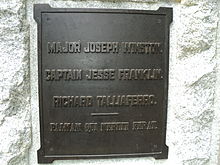Jesse Franklin
Jesse Franklin | |
|---|---|
 | |
| United States Senator from North Carolina | |
| In office March 4, 1799 – March 4, 1805 | |
| Preceded by | Alexander Martin |
| Succeeded by | James Turner |
| In office March 4, 1807 – March 4, 1813 | |
| Preceded by | David Stone |
| Succeeded by | David Stone |
| Member of the U.S. House of Representatives from North Carolina's 3rd district | |
| In office March 4, 1795 – March 3, 1797 | |
| Preceded by | Joseph Winston |
| Succeeded by | Robert Williams |
| 20th Governor of North Carolina | |
| In office December 7, 1820 – December 7, 1821 | |
| Preceded by | John Branch |
| Succeeded by | Gabriel Holmes |
| Member of the North Carolina state legislature | |
| In office 1793–1794 1797–1798 | |
| Personal details | |
| Born | March 24, 1760 Orange County, Virginia |
| Died | August 31, 1823 (aged 63) Surry County, North Carolina |
| Political party | Democratic-Republican |
Jesse Franklin (March 24, 1760 – August 31, 1823) was the Democratic-Republican U.S. senator from the U.S. state of North Carolina between 1799 and 1805 and between 1807 and 1813. He later served as the 20th Governor of North Carolina from 1820 to 1821.
Jesse Franklin was the brother of Meshack Franklin, who also served in Congress. Jesse Franklin was born in Orange County, Virginia on March 24, 1760. He was the son of Bernard and Mary Franklin, the third of seven sons. Franklin moved to North Carolina with his father in 1774 and served as major during the Revolutionary War. During the war he was captured by Tories, but escaped. Franklin was in the Battle of Kings Mountain and served as Adjutant of Colonel Benjamin Cleveland's battalion. (Cleveland was a relative of Franklin's.) He was also at the Battle of Guilford Court House. He performed further service in partisan warfare against Tories in North Carolina, service that continued to the end of the war. In Greensboro there is a monument to Revolutionary War soldiers Joseph Winston, Jesse Franklin and Richard Taliaferro, the gift of Governor Thomas M. Holt. He was a member of the state legislature in 1793-1794 and 1797-1798. He was elected to the Fourth Congress and served from March 4, 1795 to March 4, 1797. Jesse Franklin was elected as a Democratic Republican to the United States Senate and served from March 4, 1799 to March 4, 1805. Franklin was put up by the Legislature for re-election in December, 1804, but Republicans at the time were divided in their support of him and Federalists did not think highly of him, and he was defeated.[1] Franklin served as President pro tempore of the Senate during the Eighth Congress. Franklin served as a state senator in 1805-1806. In 1806 he was again elected as a Democratic Republican to the United States Senate and served from March 4, 1807 until March 4, 1813. During his second period as a senator, Franklin was known as an advocate of Madison's war measures, and as an opponent of monopolies and central banks. Franklin was appointed a commissioner to negotiate with the Chickasaw Indians near the site of present-day Memphis in 1817, an appointment he accepted at the request of General Andrew Jackson. He was Governor of North Carolina from 1820 to 1821. During his term as governor, the Canova statue was placed at the state Capitol in a new addition containing a rotunda that was considered an appropriate area for displaying it. As governor, Franklin was considered to be conscientious and practical. He advocated reform in the treatment of criminals, including abolition of ear cropping. Franklin died in Surry County, North Carolina on August 31, 1823. He was interred at the old National Park at Guilford battleground, near Greensboro.
References
- ^ Jeffersonian Democracy in North Carolina, 1789-1816. Delbert Gilpatrick, p 135.
External links
- United States Congress. "Jesse Franklin (id: F000344)". Biographical Directory of the United States Congress.
- 1760 births
- 1823 deaths
- Democratic-Republican Party United States Senators
- Governors of North Carolina
- Members of the United States House of Representatives from North Carolina
- North Carolina Democratic-Republicans
- People from Surry County, North Carolina
- Presidents pro tempore of the United States Senate
- People from Orange County, Virginia
- United States Senators from North Carolina
- Democratic-Republican Party members of the United States House of Representatives
- Democratic-Republican Party state governors of the United States



